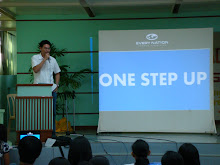The esteemed author George Bernard Shaw once wrote very thoughtfully, “If you have an apple and I have an apple, and we exchange apples then you and I will still each have an apple. But if you have an idea and I have an idea and we exchange those ideas, then each of us will have two ideas”.
Ideas are very often a misunderstood commodity for many would be or starting entrepreneurs. There are some businessmen would don’t think much of it, preferring to imitate or mimic an existing business. There are others that swear by the power of an idea, that it is a necessary requirement in starting a business.
I find there are two schools of thought when it comes to ideas. One is that it should be safeguarded and kept secret until the time comes to launch it. The primary reason for this is to prevent “competition” from stealing the idea. The second school of thought is to share the idea, with the hope of getting real and honest feedback that will allow the idea to become bigger and better.
Many would be or starting entrepreneurs are not comfortable with option two and would prefer to follow strictly option one. They cite the examples set by successful companies that safeguard their secrets and ideas zealously and assume that they should do the same. This would make sense but for one differentiating factor, the word, “successful”. Successful Companies that safeguard their ideas do so because they have a unique understanding of their business, products, and service. But a would be or starting entrepreneur may lack the insights, experience and market knowledge to evaluate his idea solely by himself.
Hence, I always prefer option 2, sharing and talking about it. Seeking out and speaking to industry insiders, potential suppliers and customers, as well as sincere friends will allow the idea to be vetted and improved on. Soliciting honest and genuine feedback will allow new considerations, options, difficulties as well as insights to arise. It may even lead to a much better idea. Or the realization that the idea may not have been that interesting after all.
Another interesting question for many aspiring entrepreneurs is, “how does one “operationalize” an idea into a viable business?” Here are some simple questions that you can ask yourself that will help provide guidance on the viability of the business idea. Ask yourself the following key questions:
1. Is it doable? – Sometimes an idea may not be anchored on real technology available or existing market conditions. It may sound perfect but the costs, or benefit may not be realistically feasible.
2. Who will be my customer? – Many times we fall in love with an idea and immediately dive into it without considering what is the true profile of our customer. I always have to remind myself, when thinking of products or services for the youth, that I am not the customer.
3. What will they be willing to pay for my product or service? – Upon identification of the customer, it helps to know whether or not they have the desire and the ability to buy the product. It may be the best product or service but if the identified customer cannot afford it, the business will not survive.
4. Is my product or service an improvement or a totally new innovation? – Its important to identify if what one is offering is just an improvement or a totally new innovation. This will allow one to decide on how to market or price his product or service.
5. What is the barrier to entry for future competition. – And lastly, if the idea really looks good, its important to consider how difficult it is for competition to follow. If the barrier to entry is low, meaning anybody can follow or improve on what you are offering easily, the business is not sustainable. But it is also a red flag if the barrier is too high, it may be a warning that there is something that has not been computed into the equation.
There is something very special in a I.O.U. It does not mean that we need to borrow to start a business but rather I means Idea, O for Opportunity and U for Understanding. It requires a perfect synergy to be able to start a potentially successful business. Owen Laughlin said, “Money never starts an idea. It is always the idea that starts the money.” Never underestimate the power of an idea, I don’t.
I would like to thank Childlink Learning Center for inviting me to speak to their students on entrepreneurship. It is never too early to plant the seeds of entrepreneurship in the minds of our future leaders. I also would like to thank Raki Urbina of Café Laguna and Johan Young of RCTV for joining me in the entrep seminar at the University of the Philippines Lahug, part of the 20th year celebration of the UP TAO Brotherhood and Sisterhood.
Let’s follow the examples of these ordinary individuals as they strive to make a difference. Each week, lets all get together and share knowledge, stories, experiences, information, all for the sole purpose of getting One Step Up.
For comments, suggestions or stories that you want to share, email me at stirspecialist@gmail.com , or visit www.stirspecialist.blogspot.com






Comments (0)
Post a Comment